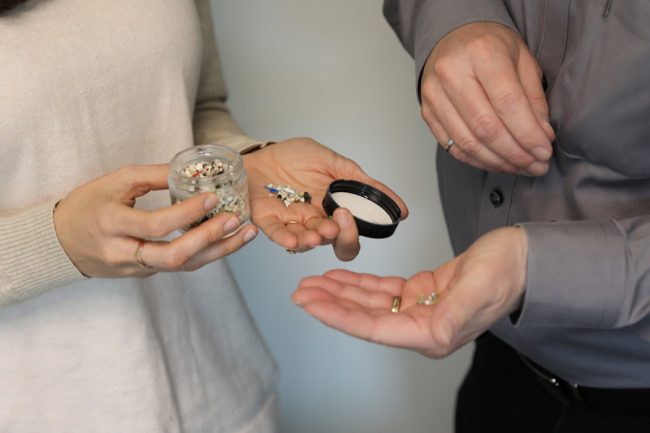
June 4, 2019
Tyler Irving
What’s the best way to quantify how much plastic is ending up in our drinking water? Can microscopic robots perform minimally-invasive surgery? What is the true environmental impact of alternative fuel vehicles?
These are some of the questions being addressed by XSeed, an interdivisional research funding program that brings together researchers from U of T Engineering with those from domains, including physics, computer science and kinesiology.
“University of Toronto is one of the very few global universities that is known for its research excellence in so many different fields,” said Ramin Farnood, vice-dean, research at U of T Engineering. “XSeed is designed to leverage this unique advantage through the support of research projects that bridge traditional disciplines to address most urgent global challenges”.
Now in its second year, XSeed is funding 19 projects, each of which addresses a complex multi-disciplinary challenge.
Professor Mo Mojahedi from The Edward S. Rogers Sr. Department of Electrical & Computer Engineering and Ruby May Sullan (UTSC Physical & Environmental Sciences) are among the recipients of an XSeed grant. Mojahedi and Sullan are researching the use of opto-mechanical properties of the cells for early cancer detection.
XSeed projects are jointly funded by U of T Engineering and many collaborating division and departments across the University, including the Faculty of Arts and Science, University of Toronto Mississauga, University of Toronto Scarborough and the Faculty of Kinesiology and Physical Education. In total, more than $1.3 million was provided in the latest round of funding to support Professors Mojahedi and Sullan and 10 other new collaborative projects, including:
- Nanoplastics: A global issue — Bob Andrews (CivMin) and Chelsea Rochman (Ecology & Evolutionary Biology)
- Evaluating the environmental impact of alternative fuel vehicles under a diverse and changing climate — Michael Grüninger (MIE) and Dirk Bernhardt-Walther (Psychology)
- Evaluating the environmental impact of alternative fuel vehicles under a diverse and changing climate — Daniel Posen (CivMin) and Paul Kushner (Physics)
- Data driven design and additive manufacturing of gradient porous metallic implants — Yu Zou (MSE) and David Levin (Computer Science)
- Continuum magnetic robots for minimally-invasive robotic surgery and industrial inspection — Eric Diller (MIE) and Jessica Burgner-Kahrs (UTM Chemical & Physical Sciences)
- Exploiting oxidative stress to enhance antibacterial treatment of tuberculosis — Jonathan Rocheleau (IBBME) and Joshua Milstein (UTM Chemical & Physical Sciences)
- Active and sample-efficient robot learning with human guidance: algorithm development and robot demonstrations — Angela Schoellig (UTIAS) and Florian Shkurti (UTM Mathematical & Computational Sciences) and Tovi Grossman (UTM Computer Science)
- A new strategy for asthma drug discovery: organ-on-a-chip enabled protein engineering — Edmond Young (MIE) and Jumi Shin (UTM Chemistry)
- B lymphocyte immune response to molecularly-defined 3D antigen and adjuvant arrays displayed on DNA origami — Leo Chou (IBBME) and Bebhinn Treanor (UTSC Biological Sciences)
- Development of a ‘virtual biopsy’ to study the systemic regulation of muscle mass in vulnerable populations — Penney Gilbert (IBBME) and Daniel Moore (UTSC Kinesiology and Physical Education)
“We are thrilled to see these innovative collaborations taking shape, and I look forward to the advances they will bring,” said Bernie Kraatz, Vice-Principal, Research at University of Toronto Scarborough Campus.
XSeed projects will be showcased at the “SEEDing Innovation” event, to be held June 27 in the Myhal Centre for Engineering Innovation and Entrepreneurship. This event will also feature projects from EMHSeed, a similar program that supports collaborations between researchers at U of T Engineering, the Faculty of Medicine and Toronto Academic Health Science Network research institutes.
“Our vision to connect faculty members and students across our three campuses is a natural way to further strengthen our world-leading research impact,” said Kent Moore, Vice-Principal, Research at University of Toronto Mississauga. “We are very excited to have so many researchers from across our community come together for this event”.
This story originally appeared on U of T Engineering News.
More information:
Jessica MacInnis
Senior Communications Officer
The Edward S. Rogers Sr. Department of Electrical & Computer Engineering
416-978-7997; jessica.macinnis@utoronto.ca